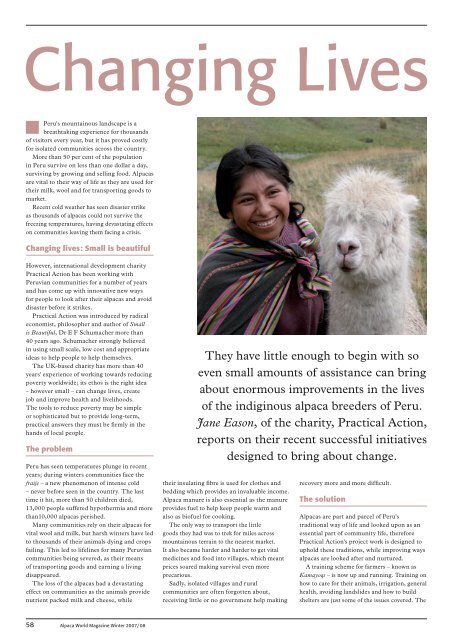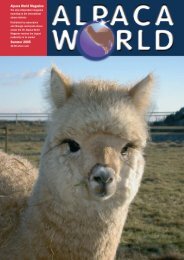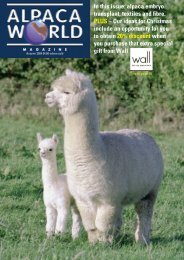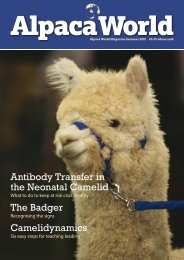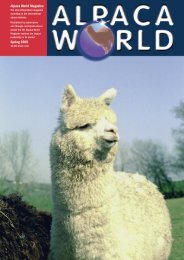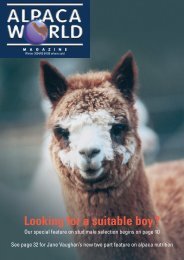Winter - Classical MileEnd Alpacas
Winter - Classical MileEnd Alpacas
Winter - Classical MileEnd Alpacas
Create successful ePaper yourself
Turn your PDF publications into a flip-book with our unique Google optimized e-Paper software.
Peru's mountainous landscape is a<br />
breathtaking experience for thousands<br />
of visitors every year, but it has proved costly<br />
for isolated communities across the country.<br />
More than 50 per cent of the population<br />
in Peru survive on less than one dollar a day,<br />
surviving by growing and selling food. <strong>Alpacas</strong><br />
are vital to their way of life as they are used for<br />
their milk, wool and for transporting goods to<br />
market.<br />
Recent cold weather has seen disaster strike<br />
as thousands of alpacas could not survive the<br />
freezing temperatures, having devastating effects<br />
on communities leaving them facing a crisis.<br />
Changing lives: Small is beautiful<br />
However, international development charity<br />
Practical Action has been working with<br />
Peruvian communities for a number of years<br />
and has come up with innovative new ways<br />
for people to look after their alpacas and avoid<br />
disaster before it strikes.<br />
Practical Action was introduced by radical<br />
economist, philosopher and author of Small<br />
is Beautiful, Dr E F Schumacher more than<br />
40 years ago. Schumacher strongly believed<br />
in using small scale, low cost and appropriate<br />
ideas to help people to help themselves.<br />
The UK-based charity has more than 40<br />
years' experience of working towards reducing<br />
poverty worldwide; its ethos is the right idea<br />
– however small – can change lives, create<br />
job and improve health and livelihoods.<br />
The tools to reduce poverty may be simple<br />
or sophisticated but to provide long-term,<br />
practical answers they must be firmly in the<br />
hands of local people.<br />
The problem<br />
Peru has seen temperatures plunge in recent<br />
years; during winters communities face the<br />
fraije – a new phenomenon of intense cold<br />
– never before seen in the country. The last<br />
time it hit, more than 50 children died,<br />
13,000 people suffered hypothermia and more<br />
than10,000 alpacas perished.<br />
Many communities rely on their alpacas for<br />
vital wool and milk, but harsh winters have led<br />
to thousands of their animals dying and crops<br />
failing. This led to lifelines for many Peruvian<br />
communities being severed, as their means<br />
of transporting goods and earning a living<br />
disappeared.<br />
The loss of the alpacas had a devastating<br />
effect on communities as the animals provide<br />
nutrient packed milk and cheese, while<br />
They have little enough to begin with so<br />
even small amounts of assistance can bring<br />
about enormous improvements in the lives<br />
of the indiginous alpaca breeders of Peru.<br />
Jane Eason, of the charity, Practical Action,<br />
reports on their recent successful initiatives<br />
designed to bring about change.<br />
their insulating fibre is used for clothes and<br />
bedding which provides an invaluable income.<br />
Alpaca manure is also essential as the manure<br />
provides fuel to help keep people warm and<br />
also as biofuel for cooking.<br />
The only way to transport the little<br />
goods they had was to trek for miles across<br />
mountainous terrain to the nearest market.<br />
It also became harder and harder to get vital<br />
medicines and food into villages, which meant<br />
prices soared making survival even more<br />
precarious.<br />
Sadly, isolated villages and rural<br />
communities are often forgotten about,<br />
receiving little or no government help making<br />
recovery more and more difficult.<br />
The solution<br />
<strong>Alpacas</strong> are part and parcel of Peru's<br />
traditional way of life and looked upon as an<br />
essential part of community life, therefore<br />
Practical Action's project work is designed to<br />
uphold these traditions, while improving ways<br />
alpacas are looked after and nurtured.<br />
A training scheme for farmers – known as<br />
Kamayoqs – is now up and running. Training on<br />
how to care for their animals, irrigation, general<br />
health, avoiding landslides and how to build<br />
shelters are just some of the issues covered. The<br />
58 Alpaca World Magazine <strong>Winter</strong> 2007 / 08


